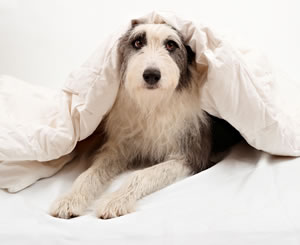Dogs Trust issues advice to help your hound beat firework fear
|
Fireworks Night can be very distressing for our four-legged friends and worried owners find themselves unable to calm their dogs down once the bangs begin. Dogs Trust, the UK’s largest dog welfare charity, is today issuing advice to ensure hounds across London have a fright-free November.
Knowing how to relieve a dog’s fireworks nerves can be difficult for dog owners. Richard Moore, Rehoming Centre Manager at Dogs Trust London, which is in Harefield near Uxbridge, explains how you can help your canine companions:
“If your dog chooses to hide then that is where he or she feels safest and it’s important that they’re allowed to stay in their hide-out as long as needed. Often owners will try and drag their dogs out for enforced cuddles and affection; this should be avoided as it will only confuse your canine.
However, if your dog decides that the safest place to be is with you then it is better to give him or her some reassuring contact and affection. This will help reduce the physiological signs of fear and anxiety and will help your dog to get through the fright of fireworks.”
Throughout the firework season Dogs Trust Rehoming Centres with particularly frightened dogs will be ensuring the radio volume in the kennels is increased and that lights are left on overnight. When needed, dedicated canine carers will work late into the evenings to ensure the dogs are as settled and as happy as possible and calming diffusers will be plugged into the kennel blocks. Canine residents that are especially noise phobic will wear DAP collars that release calming pheromones. Below are some steps that dog-owners can take to keep their dogs content:
Clarissa Baldwin, CEO of Dogs Trust also advises:
Before the fireworks begin:
• Seek advice from your vet – they will be happy to help. Be sure to give any medication prescribed before the noise begins. You can also ask about DAP – Dog Appeasing Pheromone, a scent that can comfort your dog and help him cope with his fears.
• Walk your dog before dark – make sure your dog is well exercised and has relieved himself before the fireworks begin.
• Try to settle your dog before the fireworks start – if your dog is in familiar safe surroundings it will help him cope with the noise
• Provide a safe hiding place – at noisy times around Bonfire Night, make sure your dog has somewhere safe to hide in his favourite room, perhaps under the table. Close the curtains and turn up the volume on your TV or radio to drown out the firework noises.
• If your dog responds well to certain music, make a compilation and play it at a reasonable level to drown out the sound of the fireworks. Alternatively, put your radio on.
During the fireworks:
• Don’t leave your dog alone in the house during the fireworks period – he may panic and injure himself.
• Keep your dog busy – play games or enjoy some reward-based training to keep his mind off the noises.
• Be careful not to reward your dog for reacting to noise – if he’s upset giving him attention may inadvertently reward him for being afraid. It may be better to act as if there’s nothing to worry about.
• Never force a dog outside when fireworks are being let off, and even if your dog enjoys Bonfire Night, never let him off his lead outdoors when fireworks are being let off.
After the fireworks:
• If your dog does react badly to fireworks seek advice from your vet regarding desensitisation programmes to help him cope more easily next time. As these programmes generally take several weeks or more to complete, they are not something that can be started in the run-up to firework season and must be carefully planned.
For more information visit www.dogstrust.org.uk/az/f/fireworks to download a free ‘Firework Fear and your Dog’ factsheet
October 28, 2010
